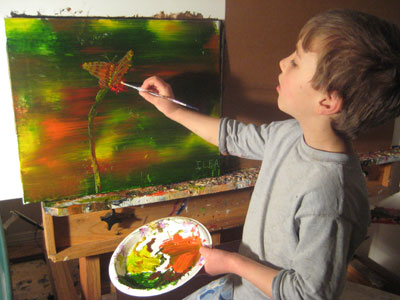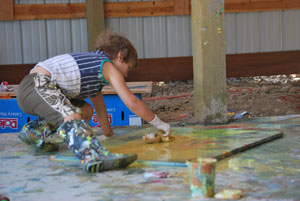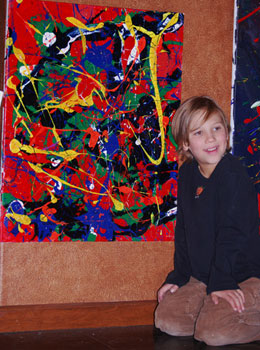

He does not read or write.
He does not go to school.
He does not listen to any stories from books or storytelling.
He does not play sports.
He does not play video games or use computer.
He does not watch television.
He does not play with toys or in playgrounds.
He has poor memory.
He battles health issues.
He is timid, willful, spirited and sensitive.
He understands humor and wit, and is very socially engaging with teenagers and adults, but not his peers.
He is bilingual, and has an accent in both Lithuanian and English languages. He is usually not articulate and sometimes stutters, but in sporadic moments in front of people displays amazing oratory abilities.
Usually Ilia’s reasoning is age appropriate, but during special inspirationional times, his creative IQ noticeably escalates, and he spontaneously creates with any theme that is suggested to him. Ilia sometimes cannot explain his creations, but, on occasion, can be very detailed and comprehensive in his oral commentaries.
Apart from art and philosophy Ilia loves playing with his four siblings, cooking, sewing, baking, hiking in the forest with his dog, comedic acting and directing.
About Prodigies
Children are recognized as prodigies if they are able to master the skill of accomplished adults before the age of ten.
Most prodigies are discovered in math, chess, music, science, medicine, athletics, acting, directing, dance, entrepreneurship, memory displays, humanitarian fields, etc., however, experts on prodigies and geniuses know that the rarest kind is a child prodigy in philosophy, wisdom, insight or philosophical poetry followed by realistic art. Even among the adult professionals this field is reserved for very few.

As Aristotle once observed in his Athenian academy more than 2,000 years ago: “There may be child-prodigy mathematicians, but there are no young philosophers.”
In fact, the youngest philosophers in the recorded history have never been children, only young adults.
According to Dr. David R. Hawkins, MD, one of the problems in attempting to understand genius is that it takes near-genius to recognize it. This preposition closely resembles one of Ilia’s aphorisms, “Only when you are profound yourself do you find love profound. “
Dr. Hawkins also believes that because geniuses are in touch with an endless source of supply, they experience only a minimum of want—for there is no need to “get” when you already “have”.
This explains the frequent reluctance of child geniuses to share their ideas or talents. It is like living in the forest cabin and showing no anticipation to take a walk in the woods as you can do it any time.
Geniuses are not in a hurry to display all they are able to do, because their ‘backyard’ is full of miracles that they see on a daily basis. It is those who are unfamiliar with such abundantly rich backyards or forests who want to grab and grasp as much as they can at one sitting or outing.

Some of the factors shaping Ilia’s talents definitely could be genetic.
Amongst the closest family and relatives of Jewish, Lithuanian, Latvian, Chinese, Hungarian, French, Swedish and Danish heritage there are renown writers, poets, teachers, generals, culinary arts experts, entrepreneurs, an award-winning film/theater director, a national cross-word champion, architectural engineer, pathologist, and a few prodigies in music and sports.
Ilia’s older siblings are also very gifted or prodigies. Most of them fluently speak three to four languages.
The oldest brother, began talking at three months and at thirteen, having entered college fully operated the family art business.
The second oldest brother was the main family chef from the age of eight, and Akiane, the only sister, has been on over fifty international television shows and documentaries for her realistic art and poetry since the age of eight. www.artakiane.com
Almost all children physically developed very early by crawling around three months and walking independently around eight months. Even though all five of them have been born underwater at home, most water babies in other families do not have such accelerated growth.
Another possible factor cultivating Ilia’s gifts was a naturally stimulating environment where most of his ideas were unconditionally encouraged and accepted.
An enormous advantage of unstructured life-schooling type of learning provided him much needed free time for observation and finding his own perspective on existence. Without any external pressure to succeed, to achieve, and to perform according to specific standards, he developed his own distinctive opinions on life and intuitive reflections on the undiscovered reserves of the unknown.
Yet another possibility could be that many more children with their purity, innocence and acceptance would be able to feel and see what is beyond our human senses and create insightfully if adults had more time, energy and desire to listen to them.
